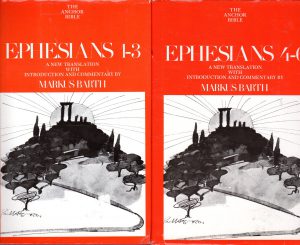 It’s possible I’m the only systematic theologian in the world who was a big fan of Markus Barth before I even knew Karl Barth existed. True story, and it’s because of Ephesians.
It’s possible I’m the only systematic theologian in the world who was a big fan of Markus Barth before I even knew Karl Barth existed. True story, and it’s because of Ephesians.
I got saved in high school and then went to a state university to study drawing. I was more or less on my own, intellectually and academically, as I began to dig deeper into Christian thought. Fascinated by the book of Ephesians, I read a few short and simple commentaries on it. But I was drawn onward by a sense that there was far more in the letter than I was getting with the help of easy commentaries. So I went down to the biblical studies section of the university library and found the largest Ephesians commentary on the shelves.
That was my sole criterion: large.
The winner was Markus Barth’s two-volume hardcover entry in the Anchor Bible series. At around 800 pages, it stood out from the others and seemed to promise the comprehensiveness I yearned for. It was also crazy hard for a beginner, and I spent months of earnest textual labor assimilating what I could of it. I’ll sing its praises, and those of Markus Barth as a scholar, at greater length some other time. I owe him much praise. It’s enough for now to say that it was a rewarding reading/chewing experience: a few pages a day, looking up multiple words per page (“epexegetical” wasn’t in the dictionaries I had available to me), and trying to decipher footnotes. Thank goodness the Greek in the AB series was transliterated. I ended up getting my own copy of the books (asked for them from my dad and step mom for my 21st birthday) so I could mark them up and take notes in the margins. My reading abilities grew daily. And every few pages there was a burst of insight that made it all worthwhile. Markus Barth was a profound exegete and a powerful expositor, with a definite intention to clarify, edify, and provoke his readers to decision and action.
But at some point I mentioned to a kind religious studies professor that I was reading Markus Barth’s Ephesians, and he said, “You know he had a famous father, right?”
No, I replied; hadn’t heard of his father.
“Oh, yes, Karl Barth, very famous theologian, you should look him up.”
I thought it was a neat coincidence that this great Ephesians scholar had a theologian dad. Eventually I looked him up; eventually I turned my focus to systematic theology; eventually I spent a lot of time reading Karl.
Or “Markus Barth’s dad,” as I thought of him back in the day.
Postscript: There’s an other other Barth: Markus’ brother Christoph, who was an Old Testament scholar. I wrote about his work here and summarized his big book here.